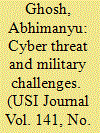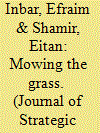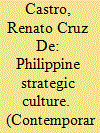| Srl | Item |
| 1 |
ID:
109027


|
|
|
| 2 |
ID:
128303


|
|
|
|
|
| Publication |
2014.
|
| Summary/Abstract |
'Mowing the Grass', Israel's strategy in the twenty-first century against hostile non-state groups, reflects the assumption that Israel finds itself in a protracted intractable conflict. The use of force in such a conflict is not intended to attain impossible political goals, but a strategy of attrition designed primarily to debilitate the enemy capabilities. Only after showing much restraint in its military responses does Israel act forcefully to destroy the capabilities of its foes, hoping that occasional large-scale operations also have a temporary deterrent effect in order to create periods of quiet along its borders. The Israeli approach is substantively different from the current Western strategic thinking on dealing with non-state military challenges.
|
|
|
|
|
|
|
|
|
|
|
|
|
|
|
|
| 3 |
ID:
108556


|
|
|
|
|
| Publication |
2011.
|
| Summary/Abstract |
The threat from North Korea is likely to continue with the apparent absence of
any intent or interest in giving up its nuclear ambitions in the near future. North
Korean provocations are likely to feature conventional weapons backed up by
Pyongyang's nuclear arsenal to deter any Korean and U.S. response against the
North. Overall, there is a possibility of further military challenges from the North
and a more unstable situation on the Korean peninsula, especially during the succession period apparently underway in North Korea. Therefore, resolving the
North Korean nuclear issue through the United Nations Security Council (UNSC)
could help the resumption of the Six-Party Talks (6PT). However, the complex
and intermingled goals of the 6PT are further limited by the new uranium enrichment program. During the present deadlock in these talks, Korea should support
the activities of the UNSC and North Korea Sanctions Committee, strongly
encourage the resumption of the 6PT, and make all diplomatic efforts to focus
international pressure on Pyongyang aimed at making it cease disrupting regional
security or furthering its nuclear ambitions. The best policy towards North Korea
is a peaceful solution of the nuclear crisis through the UNSC together with the
6PT.
|
|
|
|
|
|
|
|
|
|
|
|
|
|
|
|
| 4 |
ID:
132870


|
|
|
|
|
| Publication |
2014.
|
| Summary/Abstract |
Japan has shown three distinct strategic cultures since its emergence as a modern state in the 19th century: isolationist and non-military, militarist, and post-World War II strategic culture characterized by great reluctance to use military power abroad, even in collective self-defence. This article examines Japan's strategic culture and the potential for a fourth distinct strategic culture through the broader framework of security identity, arguing that this is evolving but has not changed as much as one might expect due to institutionalized antimilitarism and political support for the security practices it has engendered. Contemporary Japanese strategic culture can be understood through debates over recent Japanese security policy as well as actual changes in security practice. Domestic politics and a changing international environment are likely to lead Japan to a somewhat more active military role in the near term, but an analysis based on the dynamics of Japan's dominant security identity suggests that its strategic culture will continue to show a reluctance to use or develop military power beyond very limited scenarios, despite vocal efforts by some political actors to increase military activity abroad.
|
|
|
|
|
|
|
|
|
|
|
|
|
|
|
|